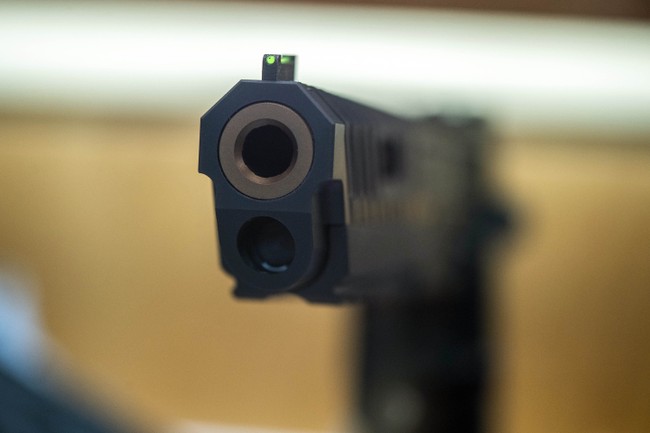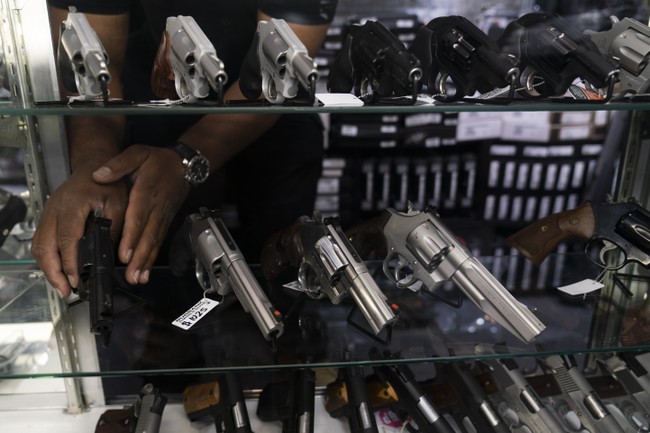When police in Boston, Massachusetts found the battered and bruised body of 21-year-old Tatyiana Flood slouched in a wheelchair in the parking lot of a public housing complex last month, it didn’t take them long to find their prime suspect. Surveillance video from the scene allegedly showed 36-year-old Kevin Boyette beating Flood with a hammer in the back seat of a Jeep before he dragged her out of the vehicle and left her in the abandoned wheelchair.
Boyette is no stranger to the criminal justice system, but as the Boston Globe reports, a dive into his criminal history raises “troubling questions over why Boyette was allowed to remain free in spite of a history of crime and violence.”
Just three weeks before Flood was murdered, Boyette was in a courtroom in Roxbury. A judge ordered court officers to arrest him on an outstanding warrant before he could leave the building, but instead they allowed him to stroll outside without taking him into custody. Three court officers are now under investigation for their actions, but this wasn’t the first time that Boyette has skated by. According to the Globe, Boyette “had a lengthy record of aggravated assault and domestic violence charges, including allegations that he abused his girlfriend and threatened her family with a knife and that, in a separate incident, he groped a woman before stabbing her cousin.”
Boyette’s path to his alleged murder of Flood can be traced through hundreds of pages of court records, covering more than a decade of arrests, convictions, dismissals, and acquittals in Roxbury.
In 2006, at age 17, Boyette was convicted of carrying a gun without a permit and sentenced to 30 months in jail, according to probation records. Three years later, he allegedly stabbed a man in a brawl outside the Suffolk Superior Court. He was charged with attempted murder and assault with a dangerous weapon, though prosecutors later wrote they dropped those charges because they had not completed their investigation of the courthouse fight, according to a motion from the prosecution.
And in 2013, Suffolk prosecutors indicted Boyette on new gun charges after police found a gun in the glove box of a car where he was a passenger. He was later acquitted by a jury after his attorneys argued that police could not prove Boyette knew the gun was there.
The next year, Boyette was convicted of violating an ex-girlfriend’s abuse prevention order and sentenced to a year in jail. In 2017, he was convicted of federal charges of possession of crack cocaine with intent to distribute. After his prison term ended, he was arrested in Roxbury for allegedly attacking employees at a pizza shop when they refused him service — a violation of his probation, which led a federal judge to send him back to prison for 17 months.
In 2021, Boyette’s then-girlfriend invited him to her family home. Her brother told Boyette he was not welcome because he had abused his sister. In response, Boyette drew a knife, according to court records. The family called police, who allegedly had to wrestle Boyette into handcuffs as he tried to enter the home. Boyette was charged with assault with a dangerous weapon and assault and battery on a police officer. It was for that case that he appeared in the Roxbury court on April 29, when court officers failed to take him into custody.
Based on the Globe’s reporting, it sounds like the harshest punishment Boyette has received was the 30-month sentence handed down for bearing arms without a valid license to carry; ironically, the one “crime” on his record that shouldn’t be a criminal offense to begin with.
Other, more serious crimes, went completely unpunished. Why didn’t prosecutors ever finish their investigation into the brawl outside the courthouse? Was it deemed less important because no gun was involved, or was this just simple incompetence on the part of the Suffolk County D.A.?
Here’s another question: why hadn’t prosecutors brought Boyette to trial for the 2021 incident? Do the wheels of justice grind so slowly in Boston that defendants in violent criminal cases can routinely expect to walk free on bond for four years or more? Or could this too have been deemed less important because Boyette allegedly threatened the family with a knife and not a gun?
Maybe all of this can be explained away by sheer incompetence on the part of prosecutors, soft-on-crime politicians, and a bloated criminal justice bureaucracy. But with Democrats at the statehouse so myopically focused on firearms, not violent criminals, it’s fair to wonder whether their fixation on “gun violence” is enabling criminals to commit, if not get away with, cold-blooded murder.
Read the full article here







![Border Patrol Moving into a New City for Operation ‘Swamp Sweep’ [WATCH] Border Patrol Moving into a New City for Operation ‘Swamp Sweep’ [WATCH]](https://www.lifezette.com/wp-content/uploads/2025/11/2025.11.23-03.39-lifezette-69232acf98e2d.jpg)



